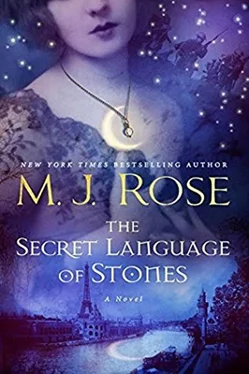“Can I buy some of the papers with his columns?”
“We keep copies of the paper for our records, of course, but we only sell copies going back a month.”
“So then I can buy the last four weeks?”
“Yes, but just the first week has a column in it.”
She sold it to me.
I stood in the street outside the building and opened the paper, but as soon as the first fat raindrops fell on the newsprint, I tucked it under my arm and looked around for a café.
Minutes later, I was ensconced in a corner table, and while the rain beat on the windows and I waited for my coffee, I opened the paper again, searching for the column.
The waiter brought my café crème. While it cooled, I started to read.
Ma chère,
Missing you has become a scar I keep opening. Just as it begins to close, I think of some moment we were together, and afresh it tears like a new wound. Is it this way for you? Do you miss me as much as I you?
The trench is wet tonight. It has been raining for days, and I think of you and your pretty blue-and-green umbrella with the silver handle and the blue agate gems set in the top of the curve. I picture you walking down the Champs-Élysées and stopping to glance in a shop window. If I were by your side, I’d take you inside and buy you whatever you liked, just to see the delight in your eyes.
Pining for you, I think of other lovers like us, separated unfairly and through some injustice of society. You and I never went to the tomb of Héloïse and Abelard, did we?
I want you to go there today or tomorrow, and if you can find some anemones, leave them there for me. Do you know the story? Bring this with you and read it while you are standing with them. Put the flowers at their feet, where the dog lies, a symbol of faithfulness…
My eyes took in one word and then the next and then I wasn’t reading anymore. I was hearing Jean Luc speaking to me. Whispering the words printed on paper.
I closed my eyes.
His voice continued.
“And then turn to your left and walk. There is another tomb…”
I looked down-yes, those were the next words.
I shut my eyes once more. The voice continued.
“… there. I don’t want to tell you too much, but it is a message for you. From me because…”
I checked these words against the words on the paper. The same. No, it was not possible.
My heart raced. My hand trembled.
I lifted the coffee, some of it splashing in the saucer. My hand none too steady, I sipped the hot liquid, sorry it wasn’t hot enough to burn my mouth because I wanted a distraction from thinking about what had just occurred.
There must be an explanation, I thought. I wasn’t a scientist, not well educated in how the mind works, how the eyes work, but surely I’d read ahead without realizing it.
I closed the newspaper, folded it, and put it in my pocketbook. I didn’t want to read any more of the column there at the café. Jean Luc planned for it to be read at Père-Lachaise Cemetery. I’d never been. I looked at my watch. There was no time to go that afternoon. It was at least a fifteen-minute ride on the metro, and once there, I wasn’t sure it would be easy to find the tomb that Jean Luc wrote about. I would need to go on Sunday.
There were soldiers buried there as well. I’d seen photos of funerals in the paper. Some services held without caskets, tombs without bodies.
I hadn’t asked Madame Alouette for any of the details of Jean Luc’s death, but suddenly it felt imperative to find out if his body was in Père-Lachaise. Maybe if I could face the reality of his death, I could quiet his voice.
Perhaps the paper had reported his funeral service. I left some coins on the table and went back to Marie Lund’s office at Le Figaro .
“I’m sorry to bother you, but did the paper print Jean Luc Forêt’s obituary and information about his burial services?”
She said she thought so and asked me to wait. While she went to get it, I watched the large room fill up as the lunch break ended and reporters took their desks. Most of them were women; the only men were either over fifty or wounded. Nothing good came of war, but at least this one was showing the world how capable women were of doing jobs previously held by men. Like my own.
I heard a commotion to the right and inched toward it, straining to listen. I suddenly remembered Monsieur Orloff’s request and wandered farther into the offices to listen for talk of Russia, the royals, or the revolution.
“They found them under the Montparnasse catacombs,” said a gray-haired woman with a telephone receiver up to her ear. Covering the mouthpiece with her hand, she relayed information as she received it to the group of reporters who’d surrounded her desk.
“How many were there?” one of the reporters asked.
“Two of them,” she said.
“How long have they been underground?” another asked.
She asked the question of the person on the other end of the phone. Everyone waited.
“At least a week,” she said.
“What are they going to do with them?” another reporter shouted.
“They are spies, you fool, they are going to throw them in prison,” someone in the crowd answered.
“Based on information the police were able to collect, they think there are dozens more Germans who’ve infiltrated the city.”
“Spies under our feet,” one of the reporters said. “In the tunnels and the mines.”
“Mademoiselle?”
I turned. Marie Lund held a copy of Le Figaro .
“He died on July eighth,” she said. “Here is his obituary.”
The black border was the same as the one on the clipping I’d retrieved after it had fallen out of Madame Alouette’s purse.
“There was no formal burial,” she read. “No bodies were recovered from that explosion. There was too much damage and all the soldiers-” She broke off.
With the war all around, with its never-ending reports of casualties, there were only so many barriers one could erect. Some stories still broke through and shook you to your core. You’d find you could endure hearing about the unnamed troops-the hundreds, the thousands, yes, the millions of soldiers-who died, but not any one of those lives that touched yours, and it wasn’t so easy to just buck up and go on as we were supposed to. Sometimes you needed to stop and bow your head and give in to the loss and grieve for the one who always said hello, or once waited for you at the door to help you carry your packages, or kissed you good night, or gave you your children. We could not be like the amazing automatons we’d seen on display. We were not just flesh and blood; we were also tears.
Marie Lund wiped hers away and handed me the paper.
“He was just such a lovely man,” she said with a last little sigh.
I returned to the shop in an even worse rain than when I’d left. Inside, Monsieur Orloff raised his eyebrows at the time of my arrival. I didn’t apologize as I put away my umbrella and hat. I stayed in most of the time. Ten minutes of tardiness should have been overlooked.
“Did you hear anything about the Bolsheviks or the Romanovs?”
“No, but there was news about some German spies,” and I told him what I’d overheard.
“Above us and below us.” He shook his head. “There are Bolsheviks underground too. I’m sure of it. Where else would you hide in Paris?”
I didn’t answer. He’d asked a rhetorical question I heard at least once a day.
“You remember the last piece we made for the actress Paulette Gillard, yes?”
“Of course.”
I knew her lover Pierre Zakine well. A longtime friend of my great-grandmother’s, he owned an art gallery and met my mother when she’d lived at Maison de la Lune. He’d become her dealer over twenty years ago and visited us in Cannes often. Once I moved to Paris, he’d started coming to the store just to check up on me and always picked up a little trinket, as he called the ready-made pieces in our cases, sometimes as a gift for his wife or his daughter. After many such visits, he commissioned a piece of high jewelry for his mistress and, liking it so much, began to order more of Monsieur Orloff’s creations. Like many men of the upper classes, he’d not allowed the war to interfere in his life any more than absolutely necessary. After all, the nightclubs were still open and Maxim’s still served. As long as you could pay, there were still oysters to feast on and champagne to buy and lovely ladies to bed.
Читать дальше












